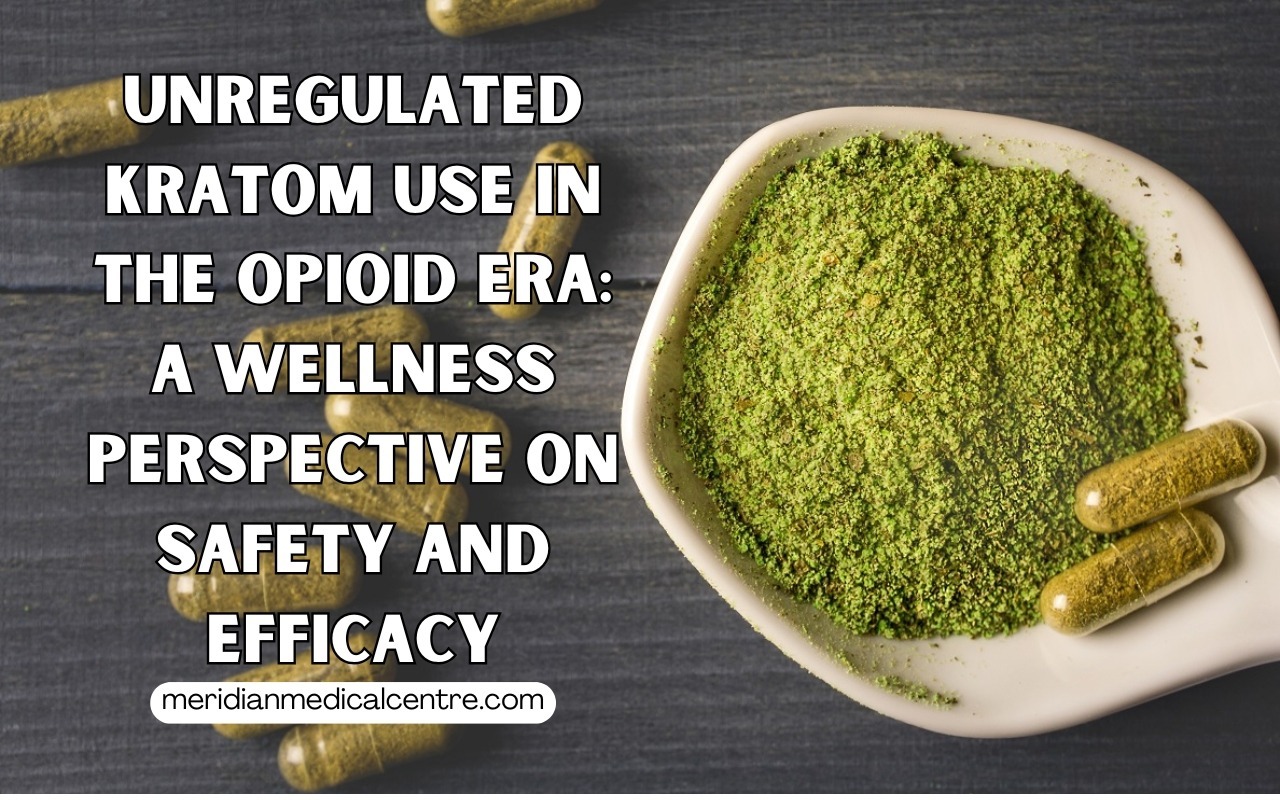
The opioid crisis has led to increased interest in alternative treatments for opioid withdrawal and recovery. One such alternative is kratom, a botanical supplement derived from the Mitragyna speciosa tree, native to Southeast Asia. While kratom has been widely discussed in anecdotal reports and self-reported surveys, data-driven research is crucial to assess its true impact on opioid recovery.
At Meridian Medical Centre, we prioritize evidence-based healthcare solutions, integrating natural wellness approaches with conventional medical care. Our commitment is to provide scientifically backed health insights, ensuring that patients receive comprehensive and transparent information about emerging treatments like kratom.
The Pharmacological Mechanism of Kratom: How It Interacts with the Body
Kratom contains two primary alkaloids, mitragynine and 7-hydroxymitragynine, which interact with mu-opioid receptors in the brain. Their effects vary depending on dosage:
- Low doses (1-5g): Stimulating effects similar to caffeine, increased alertness, and focus.
- Moderate doses (5-10g): Mild analgesic effects, euphoria, and relaxation.
- High doses (>10g): Opioid-like sedation and pain relief.
How Kratom Differs from Traditional Opioids
While kratom binds to opioid receptors, it does not cause significant respiratory depression, the leading cause of opioid overdose fatalities. However, kratom does activate dopaminergic and noradrenergic pathways, which may contribute to dependency and withdrawal symptoms with long-term use.
Clinical Data on Kratom for Opioid Withdrawal and Recovery
1. Survey and Self-Reported Data on Kratom’s Role in Opioid Withdrawal
A 2020 study from Johns Hopkins University analyzed 2,798 self-reported kratom users and found:
- 87% experienced relief from opioid withdrawal symptoms.
- 80% reported reduced opioid cravings.
- 86% found kratom beneficial for chronic pain management.
While promising, these results are based on self-reports, which are inherently limited by placebo effects, recall bias, and lack of clinical control.
2. Comparisons with FDA-Approved Opioid Recovery Treatments
Medications like buprenorphine, methadone, and naltrexone are widely used in opioid addiction treatment and have undergone rigorous clinical trials. In contrast, kratom lacks large-scale, controlled studies demonstrating consistent efficacy and safety.
| Feature | Kratom | FDA-Approved Medications (Buprenorphine, Methadone) |
|---|---|---|
| Legally Regulated? | No (varies by region) | Yes (FDA-approved) |
| Clinically Tested? | Limited human studies | Extensive randomized controlled trials (RCTs) |
| Risk of Dependence? | Moderate | Managed under medical supervision |
| Dosage Control? | No standardized dosing | Precise, medically supervised dosing |
| Long-Term Safety Data? | Insufficient research | Well-documented long-term effects |
These differences highlight the need for more standardized clinical research before kratom can be considered a reliable medical treatment for opioid withdrawal.
Potential Risks and Adverse Effects of Kratom in Recovery
1. Kratom Dependence and Withdrawal
While kratom is often marketed as a safer alternative to opioids, it can lead to physical dependence with long-term use. Symptoms of kratom withdrawal include:
- Irritability and mood swings
- Insomnia and restlessness
- Nausea and gastrointestinal discomfort
- Anxiety and cravings
A 2019 study in Drug and Alcohol Dependence found that 9% of surveyed kratom users met the criteria for moderate-to-severe dependence, suggesting withdrawal can be significant for some users.
2. Safety Concerns: Contamination and Product Inconsistency
Since kratom is not regulated by the FDA, products vary widely in purity, potency, and quality. Analysis of commercial kratom samples has found:
- Heavy metals (lead, arsenic, cadmium) contamination.
- Bacterial contamination, including salmonella outbreaks traced to kratom.
- Adulteration with synthetic opioids, increasing the risk of overdose.
3. Reported Side Effects in Clinical Data
Although kratom does not pose the same overdose risk as opioids, reported health effects include:
- Liver toxicity in chronic users.
- Hypertension and irregular heart rhythms.
- Seizures, especially when combined with other substances.
According to FDA reports, kratom has been implicated in multiple fatalities, though these cases often involved poly-drug use (opioids, benzodiazepines, or alcohol).
Kratom’s Legal and Regulatory Landscape
Kratom’s legal status varies widely across states and countries:
- Banned in: Alabama, Arkansas, Indiana, Rhode Island, Vermont, Wisconsin.
- Regulated in: Arizona, Georgia, Nevada, Utah (subject to purity and quality regulations).
- Unregulated in many states, leading to inconsistent product quality.
- Internationally: Banned or restricted in Australia, Sweden, Denmark, Japan, and Malaysia. Recently decriminalized for medical use in Thailand.
The Future of Kratom in Opioid Recovery Research
1. The Need for Controlled Clinical Trials
Current research on kratom consists largely of observational studies and self-reported data, limiting scientific conclusions about its efficacy. To validate kratom’s potential role in opioid recovery, randomized controlled trials (RCTs) are essential.
2. Could Kratom Be Standardized for Medical Use?
For kratom to be considered a legitimate medical tool, researchers must:
- Develop standardized dosing guidelines to minimize dependence risk.
- Assess long-term safety data on liver and cardiovascular health.
- Investigate interactions with other medications for clinical compatibility.
Without these measures, kratom remains an experimental supplement rather than an established medical treatment.
Conclusion: A Balanced Perspective on Kratom’s Role in Opioid Recovery
Kratom presents potential benefits in opioid withdrawal, but the lack of standardized research and regulatory oversight raises significant concerns. At Meridian Medical Centre, we emphasize data-driven, scientifically backed health solutions.
Based on current medical evidence:
- Kratom may provide short-term opioid withdrawal relief, but it is not a replacement for FDA-approved treatments.
- The risk of dependence and withdrawal exists, particularly with long-term, high-dose use.
- Product safety and regulation remain key concerns, making medical supervision essential for those considering kratom use.
Final Takeaway
Until rigorous clinical trials and regulatory oversight are established, individuals seeking opioid recovery support should consult medical professionals for evidence-based treatment options. This ensures safe, effective, and scientifically validated care in overcoming opioid dependence.
Also Read: Kratom Strains Explained




